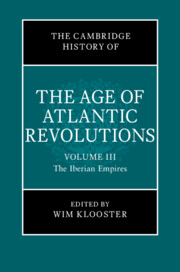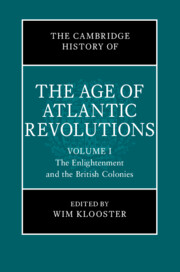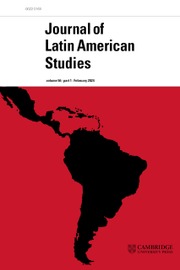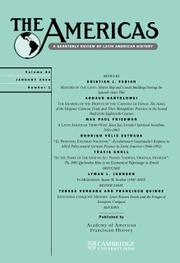The Cambridge History of the Age of Atlantic Revolutions
Volume III covers the Iberian Empires and the important ethnic dimension of the Ibero-American independence movements, revealing the contrasting dynamics created by the Spanish imperial crisis at home and in the colonies. It bears out the experimental nature of political changes, the shared experiences and contrasts across different areas, and the connections to the revolutionary French Caribbean. The special nature of the emancipatory processes launched in the European metropoles of Spain and Portugal is explored, as are the connections between Spanish America and Brazil, as well as between Brazil and Portuguese Africa. It ends with an assessment of Brazil and how the survival of slavery is shown to have been essential to the new monarchy, although simultaneously, enslaved people began pressing their own demands, just like the indigenous population.
- Covers the role of Africa during the Age of Atlantic Revolutions, a topic which is rarely explored
- Connects revolutions across the Atlantic to create a comprehensive overview of this transformative age
- Integrates the actions of enslaved and indigenous people and free people of color
- Introduces new arguments and evidence to reveal the most up to date history of the Atlantic World
Reviews & endorsements
‘Klooster has collected seventy-one essays, managing to give an idea of the ongoing debate: solid reconstructions … attempt to bring together historiography and history from different schools and perspectives. One can only appreciate the desire to reconstruct the historiographical debate because it opens the doors to the lives of scholars and their motivations and determinations in electing a theme and a research direction … The necessary nuances and chiaroscuro make the picture more authentic and point to other possible studies.’ Michaela Valente , Archivio Storico Italiano
‘[T]he volume consistently describes revolutionary processes and provides the reader with a sense of time and place.… The volume’s significance lies in its contribution to ongoing historiographical discussions on violence, gender, race, migration, circulation, and integration. Fortunately, the majority of the chapters reference publications in Spanish or Portuguese. It is commendable that a work aimed at English-speaking audiences embraces and disseminates high-quality historiography originating from outside the English-speaking academic world.… [A] valuable and significant book.’ Rodrigo Moreno Gutiérrez, Hispanic American Historical Review
Product details
October 2023Adobe eBook Reader
9781108612883
0 pages
This ISBN is for an eBook version which is distributed on our behalf by a third party.
Table of Contents
- Introduction, Wim Klooster
- Part I. The Spanish Empire:
- 1. The Spanish Empire: general overview Stefan Rinke
- 2. The Spanish Empire on the Eve of American Independence Emily Berquist Soule
- 3. The Cortes of Cádiz and the Spanish Liberal Revolution of 1810–1814: Atlantic and Spanish American dimensions Roberto Breña
- 4. The Constitutional Triennium in Spain, 1820–1823 Juan Luis Simal
- 5. Mexico: from Civil War to the War of Independence 1808–1825 Juan Ortiz Escamilla, 6. Central America Timothy Hawkins
- 7. War and revolution in the Southern Cone, 1808–1824 Juan Luis Ossa Santa Cruz
- 8. Caribbean South America: free people of color, Republican experiments, military strategies, and the Caribbean connection on the path to independence Ernesto Bassi
- 9. The southernmost revolution: the Rio de la Plata in early nineteenth century Gabriel di Meglio
- 10. Royalists, monarchy, and political transformation in the Spanish Atlantic world during the Age of Revolutions Marcela Echeverri
- 11. Africans and their descendants in the Spanish Empire in the Age of Revolutions Jane Landers
- 12. Concepts on the move: constitutionalism, citizenship, federalism, and early liberalism across Spain and Spanish America Javier Fernández Sebastián
- 13. Patriarchy, misogyny, and politics in the Age of Revolutions Mónica Ricketts
- 14. Impact of the French-Caribbean Revolutions in continental Iberian America, 1791–1833 Alejandro E. Gómez
- 15. Deferred but not avoided: Great Britain and Latin American independence Karen Racine
- Part II. Brazil, Portugal, and Africa:
- 16. Overview: the independence era in the Luso-Brazilian world Gabriel Paquette
- 17. Portugal's social and political change from the Ancien Régime to liberalism Nuno Gonçalo Monteiro
- 18. Conservative tracks towards independence: transfer of the court to Rio de Janeiro, the Porto Revolution, Brazilian autonomy Jurandir Malerba
- 19. Building new Brazilian institutions Jeffrey D. Needell
- 20. Slaves, Indians, and the 'classes of color': popular participation in Brazilian Independence Hendrik Kraay
- 21. Brazil and the independence of Spanish America: parallel trajectories, linked processes (1807–1825) João Paulo Pimenta
- 22. Waves of sedition across the Atlantic: liberal politics in Angola in the wake of Brazilian independence (ca. 1817–1825) Roquinaldo Ferreira.







